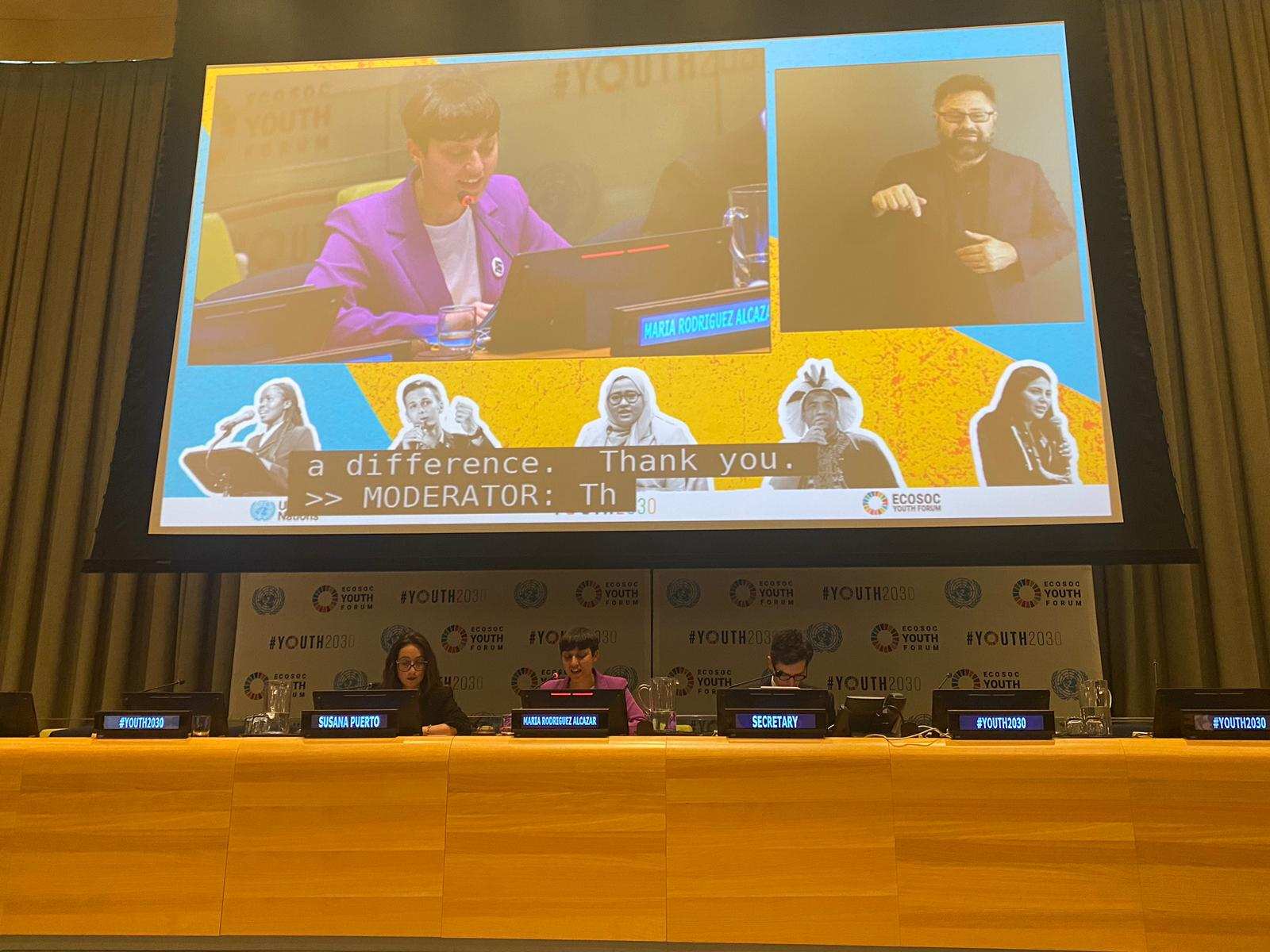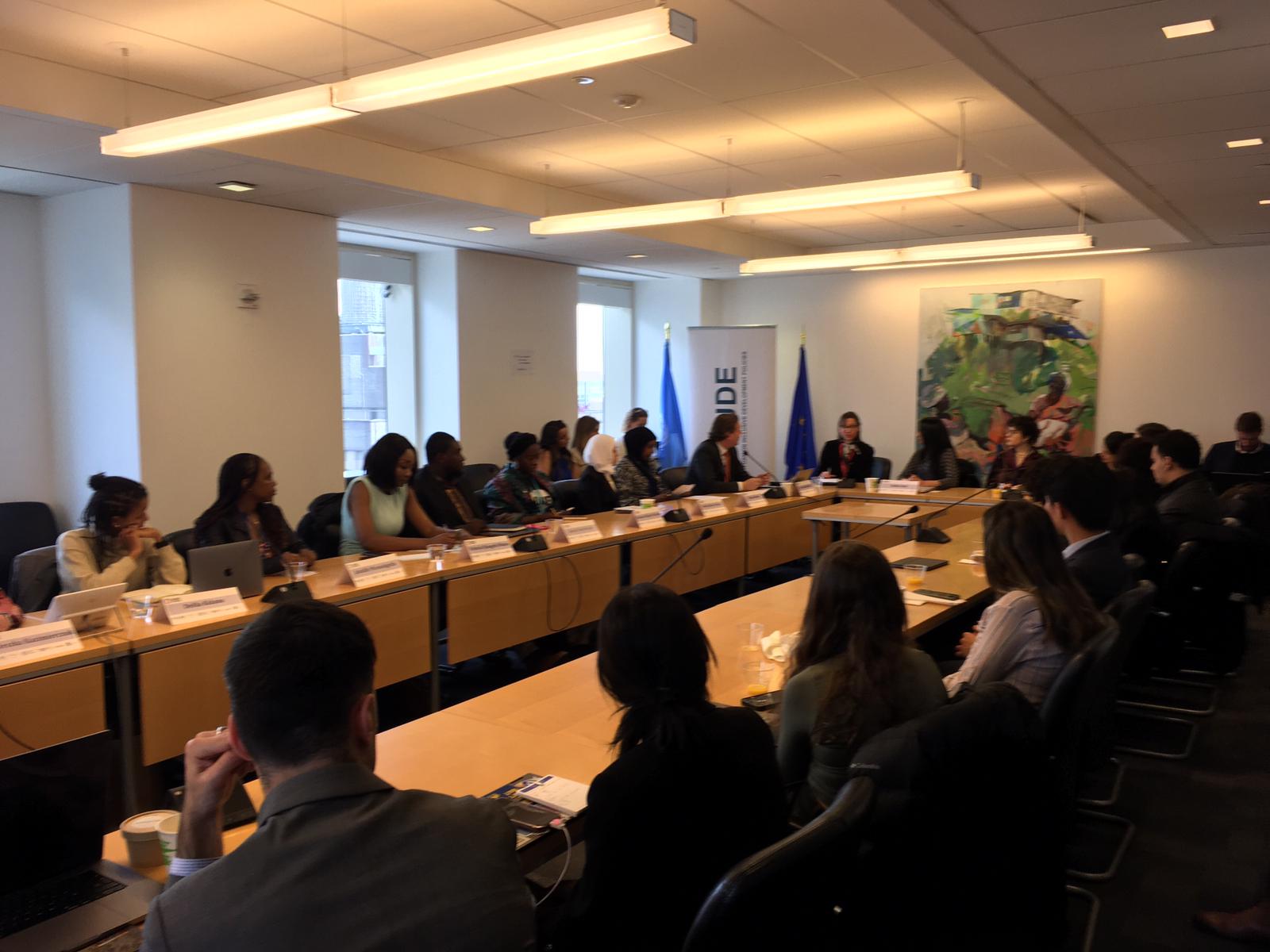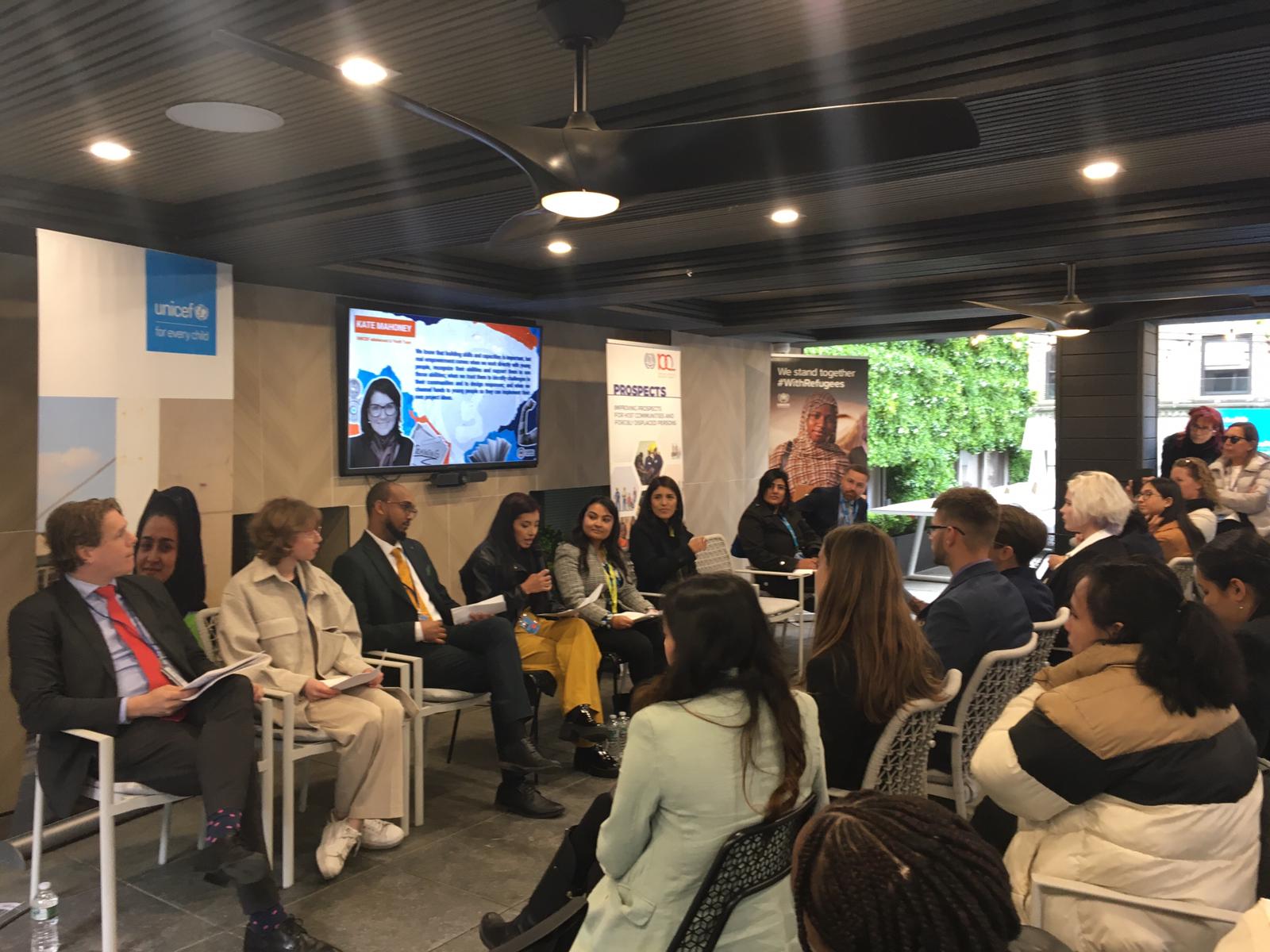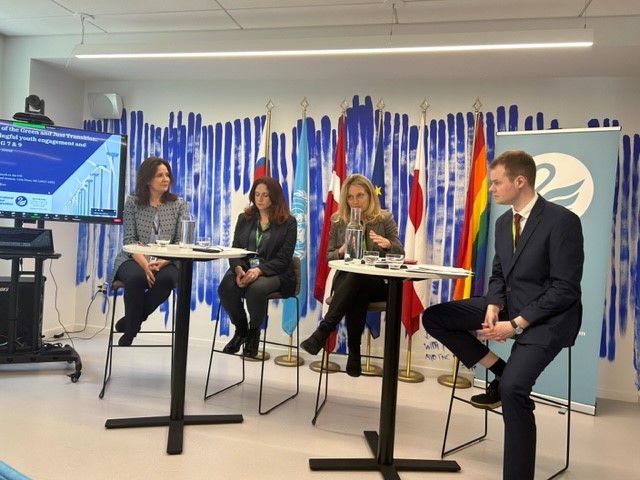ILO to advocate for decent jobs for youth at UN Youth Forum
The three-day ECOSOC Youth Forum — one of the key platforms for youth to share their ideas at the global level — was held in New York on 25-27 April 2023, the first in-person Forum since the COVID-19 pandemic. This was the largest and the most diverse young people’s gathering ever at the United Nations, with more than 800 young people attending in New York and almost 20,000 participating virtually.
The Forum provided a platform for young people, high-level government representatives, and other stakeholders to contribute to policy discussions by sharing their ideas, solutions, and innovations toward SDG implementation. It connected with key United Nations processes and events in 2023, especially the High-Level Political Forum on sustainable development under the Council’s auspices in July, and the SDG Summit, in September.
The following were the sessions co-led by ILO and Decent Jobs for Youth partners and the main outcomes:
Special Ministerial Session, “Youth-led Innovations for Decent Jobs for Youth” on SDG 17 – Financing Our Future (26 April, 16:30 – 18:00 ET)

The ILO supported the organization of the special ministerial session on “Youth-led innovations for decent jobs for youth ” with a focus on SDG 17. The session, moderated by Maria Rodriguez Alcázar, President of the European Youth Forum, allowed Member States, youth leaders and key partners to share their experiences and strategies to boost employment opportunities, foster inclusion for the most disadvantaged youth and create impactful partnerships towards the 2030 Agenda for Sustainable Development and the UN Global Initiative on Decent Jobs for Youth .
The session had contributions from the governments of China, the Gambia, Namibia, the Kingdom of the Netherlands, Paraguay, Portugal, Saudi Arabia, Uganda and Zimbabwe. It also benefitted from the experiences of global youth networks, young researchers, and young social entrepreneurs from across the globe.
The session stressed the need for targeted and urgent investments in youth employment to address the disproportionate and negative impact of the COVID-19 pandemic on the labour market outcomes of young people. Member States shared some of their efforts in fostering an enabling environment for job creation while supporting an array of initiatives to boost employability, entrepreneurship promotion, and civic and political participation of youth.
The creative innovations spearheaded by young people across diverse sectors and disciplines are shaping communities and playing a pivotal role in boosting youth employment. These innovations are strengthening the means of implementation and revitalizing partnerships under SDG17. They not only need to be encouraged and supported but also scaled up and replicated, leading to tangible impacts on public policies and efforts of international organizations, the private sector, and other stakeholders.
Young people urged Member States to foster an enabling environment for youth-led innovations and invited other stakeholders to genuinely integrate the voices and ideas of young people in their actions towards the achievement of the 2030 Agenda.
Session attendees highlighted the significance of promoting inter-generational equity, acknowledged the intergovernmental efforts made in developing the Declaration on Future Generations, and encouraged continued action by young people, Member States, and other stakeholders to advance youth employment under the auspices of the UN Global Initiative on Decent Jobs for Youth. The financing of our future requires the dynamism and innovation of young people, as well as their access to productive employment and decent work.
Side event on “Advancing Young People’s Meaningful Participation and Engagement in Forced Displacement Contexts” (25 April, 13:30 – 15:00 ET)

Co-organised by the Ministry of Foreign Affairs of the Kingdom of the Netherlands, ILO, UNICEF and UNHCR, the side event raised awareness among youth globally on the challenges faced by young refugees, IDPs and youth from host communities, and spotlighted partnerships with refugee youth and refugee youth-led initiatives bringing about positive change in their communities despite the challenges. This event also shared innovative approaches and partnerships in advancing young people’s engagement and meaningful participation in forced displacement contexts, and engaged in an interactive dialogue between young people, especially young refugees, and stakeholders working with and for youth, including governments, international organizations, NGOs and youth-led organizations, on how we can effectively promote meaningful youth engagement in forced displacement contexts.
The event suggested that the all partners commit to boosting the meaningful engagement of young people in forced displacement contexts by harnessing the nexus between youth employment and youth participation, and it brings its extensive experience working for and with youth on employment issues, as well as specific expertise on creating and promoting decent jobs, extending social protection, and advancing youth rights, voices, and agency. And, this session concluded that, through the development and rolling out of different training materials and packages, agency staff and partners will learn how to work with and for young people more effectively by recognizing young people’s agency, creating spaces and mechanisms for them to engage in programming decisions, and ceding power to them.
Side event on “Digital Skills for Inclusive and Decent Digital Economy in Africa” (26 April, 13:30 – 14:45 ET)

Led by youth, the intergenerational discussion brought together ministerial and senior representatives of governments of Uganda and the Netherlands, as well as the private sector, multilateral entities and other key stakeholders to focus on the challenges faced by youth in Africa to achieve inclusive digital transformation. Building on the recently published evidence synthesis paper Digital Skills for Youth Employment in Africa, the event contributed to the discussions on decent youth employment, meaningful youth engagement and how to build resilient infrastructures, promote inclusive and sustainable industrialization, and foster innovation (Sustainable Development Goal [SDG] 9) by enhancing digital skills for youth in Africa.
Based on the comments from the young experts and high levels, this session provided several policy recommendations. Firstly, national education institutions need to improve the quality and relevance of general education. For example, by providing digital tools for schools to improve digital education outcomes. Furthermore, they can leverage technical and vocational education & training (TVET). Secondly, policies should be tailored to local context and the heterogeneous needs of different youth groups, particularly for young women, for example by consulting youth on openly accessible digital platforms. Thirdly, governments need to seek strategic partnerships with the private sector and meaningfully involve youth in all stages of partnership development in order to align programmes to the needs of youth and the labour market. Fourthly, policymakers should invest in the digitalisation of public services and the state-citizen interface, which can support the creation of databases that can inform more appropriate policymaking. Fifth and finally, public and private financing needs to be made available to improve digital infrastructure like broadband and energy grids.
Side event on “Green Jobs for Youth: Results of Latin America and the Caribbean workshops” (27 of April, 18:00-19.30 ET)

The side event reflected on the incredible potential that lies within youth to transform the pollution-based, extractive linear economy of the past century into a nature-positive and circular economy. And provided a comprehensive overview of the challenges, opportunities, and potential strategies related to green jobs for youth in the LAC region. The discussions emphasized the importance of collaboration, youth involvement, and alignment of education with the green job market to drive sustainable development in the region.
The session provided several key insights. The Green Jobs for Youth Pact is a testament to our collective belief in the power of change and the potential to address the triple planetary crisis of nature loss, pollution, and climate change. The potential for creating 100 million green jobs in the coming decades demonstrates the importance of reskilling and investing in a green, circular economy. The Pact aims to empower marginalized and climate-vulnerable youth with green, employable, and entrepreneurial skills through collaboration with education partners, university networks, social partners, and youth movements. To successfully implement the Green Jobs for Youth Pact in the LAC region, it is essential to address the region's needs regarding professional competencies for green jobs in higher education institutions. Key building blocks under the Pact outcomes include governance, job opportunities, skills and competency development, intersectoral cooperation, and internal management of higher education institutions. Young leaders emphasized the importance of joining the movement, institutionalizing youth engagement, and integrating environmental education into government policies and higher education curricula. Youth-led innovations are key catalyzers to achieving greener jobs for all and tangible contributors towards the achievement of the 2030 Agenda.
Side event on “Youth as Drivers of the Green and Just Transition: Delivering meaningful youth engagement and leadership on SDG 7 and 9” (26 of April, 13:30-14.30 ET)

ILO NY, UNDP and DPR Denmark shared experiences on leaving no one behind to ensure that all youth benefit from agree transition. Moderated by the Danish Youth delegate, the objective of this youth-led side event was to highlight the critical role of young people in achieving the SDG 7 and 9 and 17 and to promote concrete actions and recommendations for enhanced commitment of the international community to young people's aspirations for a just, green transition. The event provided a platform for young people to showcase their innovative approaches and contributions to advancing efforts on SDG 7 and 9 with a focus on youth partnerships and job creation within green industries.
Based on the discussion, the event concluded that all stakeholders should incorporate the principles of “leave no one behind” in the just transition and ensure that all youth benefit from a green transition. It is essential to have partnerships with youth support innovation for clean energy and greener industries and infrastructure. And suggested that young people meaningfully contribute and participate at all levels of decision-making for the implementation of the SDGs 7 and 9.
--------------------------
The ECOSOC Youth Forum concluded yesterday with the launch of the an insights paper, which consolidates the reflections and proposals from young people on the good practices, lessons learned, and ambitions for achieving the 2030 Agenda for Sustainable Development.




